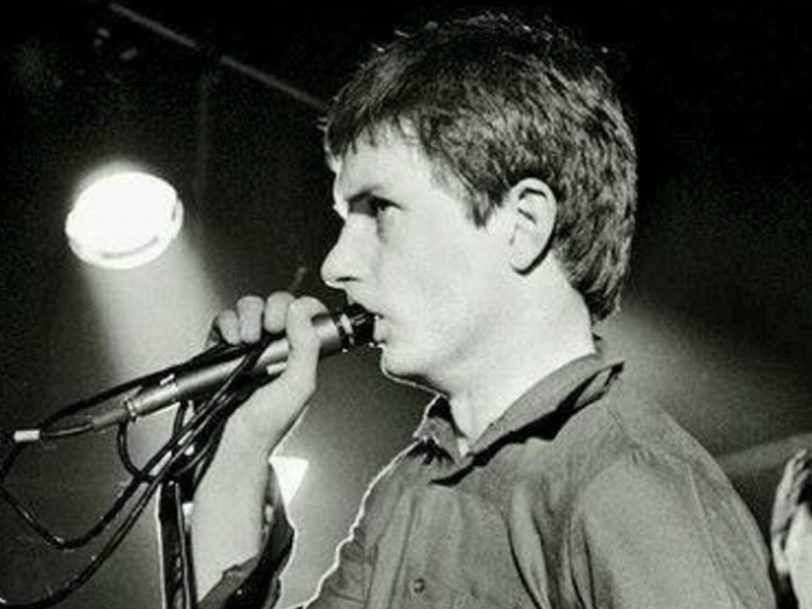Manchester was quick to latch onto punk music, with soon-to-be Buzzcocks stars Pete Shelley and Howard Devoto inviting Sex Pistols to play two of their first gigs outside London, at the Lesser Free Trade Hall in the summer of 1976. Yet you could argue that the city also birthed the post-punk era when Joy Division made their live debut at Pips Discotheque 18 months later, on 25 January 1978.
Listen to the best of Joy Division here.
“It urged us to carry on – a ‘Well show them’ attitude!”
Joy Division’s future personnel were in attendance at the Pistols’ now-legendary Manchester shows. Bassist Peter Hook and guitarist Bernard Sumner (and future Factory Records boss Tony Wilson) caught the band’s first show, in June 1976, while frontman Ian Curtis attended their return concert the following month. It’s since been well documented how the Pistols’ anarchic attitude and DIY approach galvanised the trio (and also the likes of Morrissey, Mark E Smith and future Simply Red frontman Mick Hucknall) into forming their own groups, though initially Joy Division traded as Warsaw, a name adapted from Warszawa, the title of David Bowie and Brian Eno’s otherworldly collaboration on Bowie’s landmark 1977 album Low.
Towards the end of 1977, however, it emerged that another group, Warsaw Pakt, were active on the London circuit, and they’d also produced Europe’s first “instant” album. The band had recorded a live gig onto a master disc in a single session one Saturday night in November 1977, and 5,000 copies of the album, titled Needle Time, were available in shops the following Monday morning.
As this group were now on record, Warsaw needed to change their name in time for the new year. After rejecting several less-than-serious contenders, such as Sunshine Valley Dance Band and Slaves Of Venus, a more promising name came into the running.
“We didn’t think we had an ‘image’, and we didn’t want one”
“Bernard and Ian both liked the name Joy Division,” drummer Stephen Morris recalled in his memoir, Record Play Pause. “It was taken from the book House Of Dolls, a novella by Ka-tzetnik 135633 (the pen name of holocaust survivor Yehiel De-Nur) that documents the Nazis’ sexual slavery of women in the concentration camps.
“Joy Division became the favourite for a new name,” Morris added. “Once it gets tangled up with how you look and the music you play, it becomes part of your image, but we didn’t think of the implications of that. With hindsight, we were a little naïve. We didn’t think we had an ‘image’, and we didn’t want one.”
Having adopted their new name as 1978 arrived, Joy Division lined up their live debut for 25 January at Pips, a popular city centre discotheque situated on Fennel Street, just behind Manchester Cathedral. The band were already familiar with the venue.
“When punk got big, Pips had started punk nights alongside their regular Bowie and Roxy [Music] nights,” Peter Hook recalled in his book Unknown Pleasures: Inside Joy Division. “Me and Barney used to go quite a bit. One night, they had a competition to win Sex Pistols’ Never Mind The Bollocks album and I won by correctly naming the lead singer. I’ve still got the album at home.”
“Ian nearly didn’t get to sing at all”
In truth, Joy Division’s live debut made for a rather inauspicious start. The band headlined, with support from two other local acts, Connection and The Stance. Due to the latter act’s on-stage antics, Ian Curtis almost missed out on performing with his own band that night.
“Ian nearly didn’t sing at all after being thrown out for kicking glass The Stance had broken on stage,” Stephen Morris recalled. “He was only being helpful, trying to tidy the place up a bit, as I recall.”
“The bouncers left Ian cooling his heels outside until 15 minutes before Joy Division came on stage,” fan and author Mark Johnson wrote in his book An Ideal For Living. “He tried to plead with them, saying, ‘But I’m the lead singer,’ but the bouncer just said, ‘I don’t care if you’re The Pope, you’re not coming in.’”
Even when Curtis did finally gain entry, he struggled to win over an audience consisting primarily of two factions – friends of Peter Hook’s from Salford who’d come to cheer on Joy Division and friends of The Stance, who were simply out for a ruck.
“The punch-up continued unabated”
“The two camps engaged themselves in a brawl that rolled back and forth in pendulum fashion across the front of the stage,” Stephen Morris remembered. “Ian did his best to discourage this but to no avail. The punch-up continued unabated, with Hooky joining in on his mates’ side.”
Nonetheless, Joy Division’s live debut was by no means a disaster. Though their setlist still included soon-to-be discarded punk remnants Reaction and Inside The Line, it also featured a couple of fantastic new tunes, Ice Age and the dark, gothic, future Unknown Pleasures classic Day Of The Lords. The leery crowd at Pips may not have realised it, but they’d got in on the ground floor: Joy Division’s remarkable transformation from punk wannabes to majestic post-punk icons had begun.




